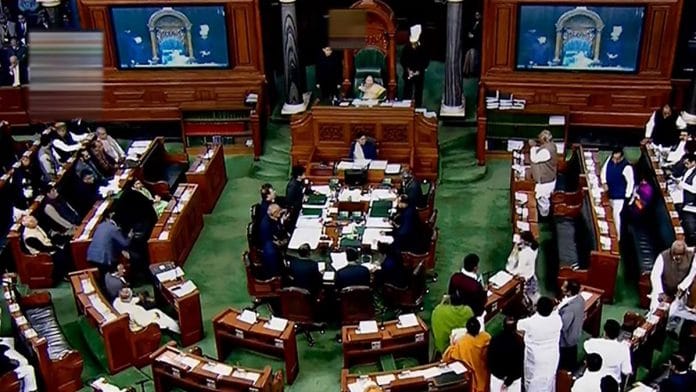Reservation bill exposes Narendra Modi government’s policy and political failures.
While there are a number of compelling legal arguments against the Constitution (124th) Amendment Bill that seeks to provide 10 per cent reservation to ‘weaker’ upper castes, no party in the Lok Sabha has come out with a strong political counter. Some speakers did raise the issue about the timing of the Bill but its social justice credentials were left largely unquestioned.
As the Bill has now been introduced in the Rajya Sabha, the Dravida Munnetra Kazhagam (DMK) could be the only party which will rise to oppose the enactment of quotas for forward castes and expose the move as a policy and political failure.
In a nutshell, the Constitution (124th) Amendment Bill (Bill, hereinafter) is to social policy what demonetisation was to economic policy. The entire edifice of social justice built on the basis of proportional representation, inclusion and equal opportunities will be in danger of imminent collapse if this Bill passes judicial scrutiny.
The reason why reservations are seen as an integral social policy solution is because they address the historical wrongs in the form of caste-based discriminatory practices. The differential treatment and structural discrimination in society, especially in the realms of education and employment, was on the basis of caste. It is this social problem that needed to be addressed; and it has been done in the past through various constitutional measures to provide reservations on the basis of social and educational backwardness. However, the present Bill aims to provide equal opportunity for economically weaker sections among forward castes. It is akin to using chemotherapy for common cold. Not only is it a wrong diagnosis, it could prove fatal for the overall health itself.
Also read: Lok Sabha passes 10% quota for upper castes, opposition supports it despite reservations
The Bill has two major components. First, it says that the state shall provide “for the reservation of appointments or posts in favour of any economically weaker sections of citizens other than the classes mentioned in clause (4), in addition to the existing reservation”, and second that the extent of reservation would be “subject to a maximum of 10% of the posts in each category”. The Bill, unfortunately, fails the common sense test on both counts. There is no history of any structural discrimination against economically weaker sections among the forward castes. There have always been obvious impediments to equal opportunity for people who are from economically weaker sections but this is true across castes and religion. As such, the problems faced by the poor are not limited to any one caste or group.
The government has also provided no ostensible reasoning on how they arrived at the magic figure of 10 per cent. We have seen, in the past, that governments have appointed expert committees to study, assess and recommend backwardness and social disabilities among groups, and that has been the scientific and rational basis for extending reservations. The government of Tamil Nadu expanded the scope of reservations on the back of recommendations by the A.N. Sattanathan Commission and the Ambashankar Commission while at the national level the Mandal Commission played a similar role. By not taking a scientific approach, the government has revealed that the present Bill is devoid of any substantive thinking.
Also read: Modi pushes upper caste quota ahead of lok Sabha polls, but where are the jobs?
Another problematic area of the Bill is the definition of what constitutes economic weakness. The Bill, in the explanation provided under Section 2, says that “economically weaker sections” shall be such as may be notified by the State from time to time.” It is patently unclear whether the state governments will be allowed to issue notifications or if this power has also been wrested by the Centre. Nevertheless, any notification issued is liable to be scrutinised by the judiciary and can be subjected to further contentious deliberations.
In all, the government has shown itself to be politically desperate and crying for a way out of the governance mess it finds itself in. Perhaps, Narendra Modi even expected a face-off on the floor of Parliament but with the majority of political parties on board, he has been denied any chance to claim victory. The Constitution (124th) Amendment Bill, therefore, has turned out to be not just a dud in terms of policy but also politics.
The author is DMK spokesperson and advocate, Madras High Court.







Is it surprising that the DMK and its friends/rivals oppose reservtion based on economic need? With their blatant and selfish opposition and enmity toward Brahmins, they have cornered benefits and wealth for themselves through unbridled corruption. They do not want it to be compromised even slightly.
The two are not in the same league. This measure must stand up to judicial review, on the 50% ceiling being breached and the benefit of reservation being extended to people who have not suffered historical social injustice. Demonetisation was in a class of its own. It bears part of the responsibility for last year’s loss of eleven million jobs.
It is alway easy to blame without proof. Firstly what is the proof of loss of 11 million jobs. Also how are these attributable to demonetisation. The contra argument is that if demonetisation had not been done,, inflation would have skyrocketed as in 2014 and people would not have had money to eat food. If you simply dislike PM Modi it may be wiser to say that rather than to maquerage as an economist. Kejriwal started this trend of accusing without proof, next is rahul gandhi and as always the award wapsi gang